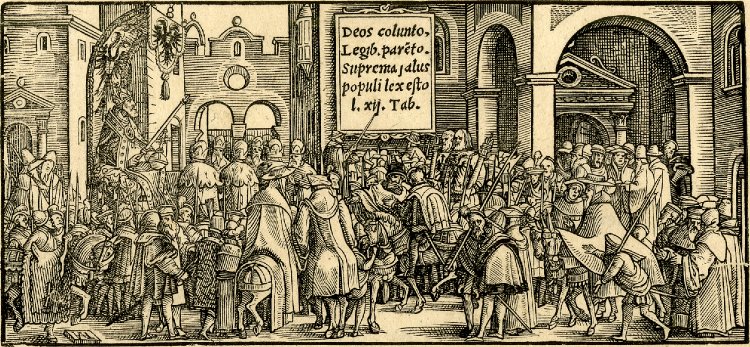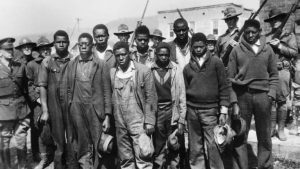In 1517, when the 95 Theses were first posted, Martin Luther had no intention of breaking from the Roman Catholic Church. Rather, he sought to reform the Church’s view on indulgences, believing that no one could buy their way into heaven. Believing that his view was deeply rooted in Scripture, he was confident that Church scholars would agree with him. Instead, the Church hierarchy responded by accusing Luther of heresy, wanting to quell any question of their authority. As a result, what was initially an effort to reform the Catholic faith eventually transformed into a major schism in Christianity itself.

Prior to sparking the Protestant movement, Martin Luther was an Augustinian monk teaching at the University of Wittenberg in Germany. In 1517, Pope Leo X sanctioned indulgences to be sold to raise money for the construction of St. Peter’s Basilica in Rome. An indulgence consisted of money given to the Church in exchange for less time in purgatory, which was conceived as a theological waiting room where imperfect souls were purified after death before they enter heaven. People essentially believed that this meant they could buy a way into heaven for themselves and their loved ones.1 As a result of the Pope’s decree, a Dominican monk, Johann Tetzel, began preaching in favor of these indulgences in the towns of Jüterbog and Zerbst near the university.2 Luther responded to this by writing to the archbishop, admonishing him by asserting that simply paying money to the Church does not purify the soul.
When his protestations went unanswered, Luther posted his 95 Theses. The theses were arguments opposing the manner in which indulgences were being sold.3 Most of the theses did not contradict Catholic doctrine, so it is widely believed that Luther wrote them to spark a theological academic debate. The theses, originally written in Latin, were translated into German and put into wide circulation; this caught the attention of Rome. Fearing that the funding for St. Peter’s Basilica was under threat, Leo ordered Luther to be investigated. In response, Luther sought the support of a Germanic prince, Frederick the Wise. Frederick granted Luther support and protection, insisting that the investigation take place in Germany.4 In response, Leo asked the papal legate in Augsburg, Cardinal Cajetan, to investigate Luther. Brought before Cajetan, Luther was asked to renounce his theses and recant his accusations against the Church. Luther refused, but agreed to stop commenting on indulgences and listen to the Church. Although this was not Cajetan’s desired result, Frederick allowed Luther to return to Wittenberg.5

The following year, 1519, Luther agreed to debate the theologian Johann Eck. Eck instigated the debate by comparing Luther’s positions to Jan Hus, a well-known heretic that had been excommunicated and executed a hundred years earlier. This forced Luther to declare that the Church had been wrong to condemn Hus, opening himself to charges of heresy.6 Eck had given the pope the opportunity to bring excommunication charges against Luther. However, the Holy Roman Emperor Charles V, not wanting to upset Frederick the Wise, forced the pope to subject Luther to a hearing at the Diet of Worms. At this time, Luther’s cause was gaining popularity among Germans. The emperor could not afford to upset the German prince, needing his support to fight an ongoing war with France and keep the Ottoman Empire from Austrian lands.7
During the trial, Luther was led into a room where his accusers had piled his works on a table, read the titles aloud, and asked if these books belonged to Luther. Luther replied that the books belonged to him. He was then asked to renounce them. Luther then asked for time to consider. When he returned the next day he refused to reject anything, saying that unless he was disproved by Scripture, he was bound by his conscience to defend his work.8 He felt that he was strongly supported by the Bible. However, Church officials saw this as a rejection of their authority rather than an appeal to Scripture. Charles V, though angered, could do nothing to condemn Luther as long as he remained at war. Instead, he planned to send Luther back to Wittenberg marked as a heretic.9 However, before he reached the university, Frederick the Wise secretly had Luther taken to Wartburg Castle.10
Throughout the next few years, Luther continued to defend his works. One of his biggest achievement during this time was the translation of the Bible from Latin into German. Still, he was forced to remain hidden. Charles V, after securing an alliance with the pope in the war against France, no longer needed ties with Frederick the Wise. This allowed the papal bull, proclaiming Luther’s excommunication, to be issued, adding a decree which ordered that no one give Luther refuge.11 It was ultimately his refusal to retract his works that prevented Luther from reforming the Church. Pope Leo X, Charles V, and other high Church officials perceived Luther’s passion for reform as a challenge to authority. In contrast, Luther believed that his works were strongly supported in Scripture. The miscommunication and stubbornness of both parties ultimately led to a major schism within Christianity. When the Church labeled him a heretic, Luther had no choice but to begin his own branch of Christianity, Lutheranism, so that he could continue to practice the faith to which he had dedicated his life.
- Renaissance and Reformation Reference Library, July 2002, s.v. “Martin Luther: Founder of Lutheranism” edited by Julie L. Carnegie. ↵
- New Catholic Encyclopedia, September 2003, s.v. “Luther, Martin” by Bill Ditewig. ↵
- Funk and Wagnalls New World Encyclopedia, 2016, s.v. “Luther, Martin” ↵
- Renaissance and Reformation Reference Library, July 2002, s.v. “Martin Luther: Founder of Lutheranism” edited by Julie L. Carnegie. ↵
- New Catholic Encyclopedia, September 2003, s.v. “Luther, Martin” by Bill Ditewig. ↵
- Renaissance and Reformation Reference Library, July 2002, s.v. “Martin Luther: Founder of Lutheranism” edited by Julie L. Carnegie. ↵
- Renaissance and Reformation Reference Library, July 2002, s.v. “Martin Luther: Founder of Lutheranism” edited by Julie L. Carnegie. ↵
- Encyclopedia of World Biography, December 2004, s.v. “Martin Luther,” by Andrea Henderson. ↵
- Julius Koestlin, Life of Luther (Project Gutenberg Literary Archive Foundation, 2006), 105-116. ↵
- Funk and Wagnalls New World Encyclopedia, 2016, s.v. “Luther, Martin” ↵
- Julius Koestlin, Life of Luther (Project Gutenberg Literary Archive Foundation, 2006), 105-116. ↵



94 comments
Evelin Joseph
I love this article and the person described through this article, Martin Luther! It was truly inspiring to hear that Luther fought against the church and its unreasonable guidelines in order to stand up for what he believed in. He was sure that the bible stated you cannot buy your way into heaven and fought very hard to prove that to the others around him. It was encouraging that he refused to reject his works and refute them, even as it led him to be labeled as a heretic. He never once gave in and even formed his own branch of Christianity to prove his point.
Mariah Cavanaugh
This is a great article about a point that is seldom communicated about Martin Luther, that he may not actually have been seeking to break from the church. Adding the background of some of the scandalous things going on in the Catholic church at this time really helps put his actions into context for the time. The idea that you would buy your way into heaven would be hard to imagine in the modern world, it is not hard to see how it would lead to disillusionment with the Church. It seems as though Luther was seeking a way to mend that disillusionment with the institution while still practicing the faith he had dedicated himself too. Thank you for the insight!
Nicolas McKay
Awesome job on your article once again Tess! this one is certainly deserving of an award in my eyes. You did a great job of telling the story of a man I once considered a rogue carving his own path, but now view him as a man fighting impossible odds for what he believed was right. The way you shed light on the details of his life and portrayed him was truly amazing.
Sergio Cervantes
As a child, I always wondered why there existed multiple denominations of Christianity until a name was given to me, the name of Martin Luther. This article provided much information over his life, what he was accused of, and why he continued to practice his faith even in the face of adversity from multiple historical figures. It is interesting to see how politics played its course in the trials of Martin Luther which inevitably ended with the formation of a new Christian denomination, Lutheranism.
Ana Gonzalez
Nice article! You did a good job of telling the story of Martin Luther and his 95 Theses. I like that you were very clear in explaining that his intentions were not to get rid of the church’s authority but instead it was to reform it and improve it. But then, he was judged for his theses and exiled.
You incorporate your research very well into your article to explain the story of Martin Luther. I also like that images you used because they are simple but they help develop your article.
Great job! Thank you for your article!
Marissa Gonzalez
This was a great article since it describes a major point in religious history. Luther’s 95 Thesis made a big impact since it caused a debate whether or not indulgences were correct. The Catholic Church seemed challenged during this time due to this. This caused Luther to separate into a separate branch of Christianity since he did not agree with all the Church’s teachings. I learned a lot from this article and you did well with describing the points of history that made an impact to how religion is categorized now and what caused it to be this way. Good job!
Nicolas McKay
This was an awesome article Tess! You did a great job illustrating the struggles he faced in his pursuit of what he believed was right. He truly faced an uphill battle, challenging the entire church. Prior to this article I believed Martin Luthor had left the church right off the bat, learning that his intention was to never leave was quite interesting. I definitely view him in a different light now, thanks to this article. Great Job
Nahim Rancharan
This article was an excellent read. It did a great job at highlighting the contributions of Martin Luther. More notable for his involvement in the Protestant Reformation and the translation of the Bible from Latin into German. Although he was classified as a heretic, Martin Luther had made several advancements, especially when it came to the religion. It was interesting to see how although he had many difficulties along the way, he stayed true to his beliefs and went against the grain; leading to one of the greatest schisms in Christianity. Martin Luther helped pave the way for many people to challenge authority if seen fit and this article clearly highlights that point. Good Job!
Briana Bustamante
Very well written article! You were so organized and your sources were extremely supportive! I remember learning about Martin Luther in High School, so it was good to have a refresher on who exactly he was. It was a good thing that you stated that Martin Luther was not trying to separate from the Catholic Church, he was rather trying to fix the system of indulgences. Great Job and very informative!
Bailey Rider
This was a very well organized article! I love reading about Martin Luther. He started the Protestant revolution even though that wasn’t even his plan! He just wanted to reform the Catholic Church. I am in awe that he nailed his 95 thesis to to door of the church, what a way to make a statement. It must have been terrifying knowing that he could die for being a heretic, thankfully he stuck his ground though. Thank you for the well written article!